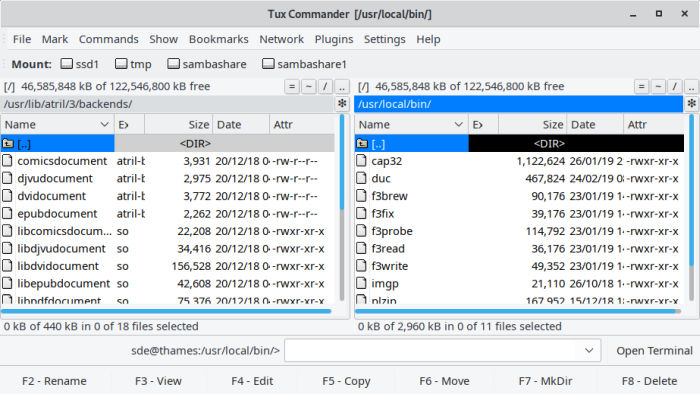

- SETTING UP FILE ASSOCIATIONS FOR DOUBLE COMMANDER HOW TO
- SETTING UP FILE ASSOCIATIONS FOR DOUBLE COMMANDER INSTALL
- SETTING UP FILE ASSOCIATIONS FOR DOUBLE COMMANDER WINDOWS
This is useful if you want to reset system variables after running a report that alters them. If you alter any variables, this script can be run to restore the original values. You can store the current SQL*Plus system ("SET") variables in a host operating system file (a script) with the STORE command. Storing and Restoring SQL*Plus System Variables See the SET command for more information on these and other SET command variables you may wish to set in your SQL*Plus LOGIN file. Followed by text, sets the text to be displayed each time SQL*Plus pauses (you must also set PAUSE to ON).įollowed by the connect information variable in the form:Ĭhanges the SQL*Plus command-line prompt to display the SID of the database you are connected to.įollowed by ON, displays the current time before each command prompt.

You may wish to add some of the following commands to the LOGIN file: SET LINESIZEįollowed by a number, sets the number of characters as page width of the query results.įollowed by a number format (such as $99,999), sets the default format for displaying numbers in query results.įollowed by a number, sets the number of lines per page.įollowed by ON, causes SQL*Plus to pause at the beginning of each page of output (SQL*Plus continues scrolling after you enter Return). You can modify your LOGIN file just as you would any other script. When you start SQL*Plus, it automatically searches for your user profile and runs the commands it contains.Ī user profile is ineffective in the iSQL*Plus user interface context, and cannot be used to control the initial settings or behavior of an individual iSQL*Plus session. You can add any SQL commands, PL/SQL blocks, or SQL*Plus commands to your user profile. SQL*Plus searches this colon-separated list of directories in the order they are listed. SQL*Plus searches for the user profile in your current directory, and then the directories you specify with the SQLPATH environment variable. SQL*Plus also supports a User Profile, executed after the Site Profile. If SQL*Plus is removed, the site profile file is deleted.
SETTING UP FILE ASSOCIATIONS FOR DOUBLE COMMANDER INSTALL
If a site profile already exists at this location, it is overwritten when you install SQL*Plus. The site profile file is $ORACLE_HOME/sqlplus/admin/glogin.sql. The global Site Profile allows the DBA to set up SQL*Plus environment defaults for all users at a particular site users cannot directly access the Site Profile. SQL*Plus executes this script whenever any user starts SQL*Plus and SQL*Plus establishes the Oracle connection. SQL*Plus supports a global Site Profile, a SQL*Plus script created by the database administrator. The exact names of these files is system dependent see the Oracle installation and user's guide provided for your operating system for the precise name. You can do this through two host operating system files, the Site Profile for site wide settings, and the User Profile for user specific settings. You may wish to set up your SQL*Plus environment in a particular way (such as showing the current time as part of the SQL*Plus command prompt) and then reuse those settings with each session.
SETTING UP FILE ASSOCIATIONS FOR DOUBLE COMMANDER WINDOWS
SETTING UP FILE ASSOCIATIONS FOR DOUBLE COMMANDER HOW TO
This chapter explains how to configure your SQL*Plus command-line and iSQL*Plus environments.


 0 kommentar(er)
0 kommentar(er)
